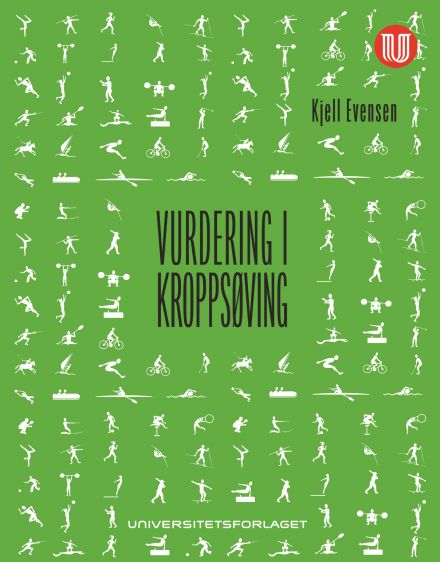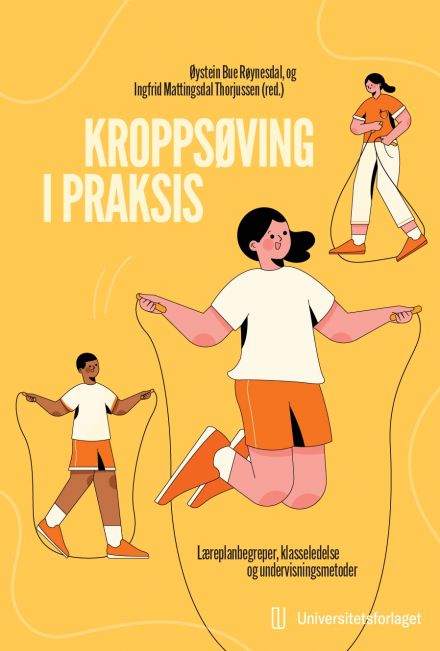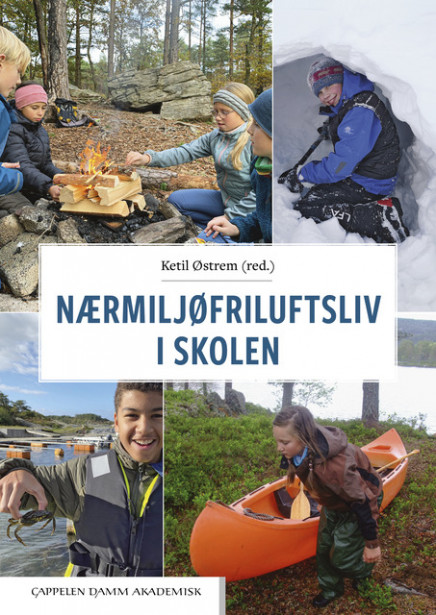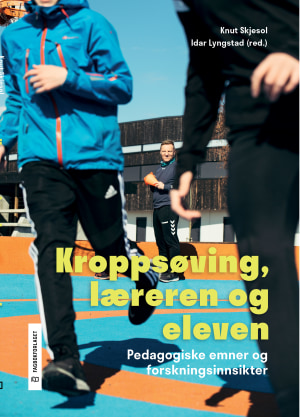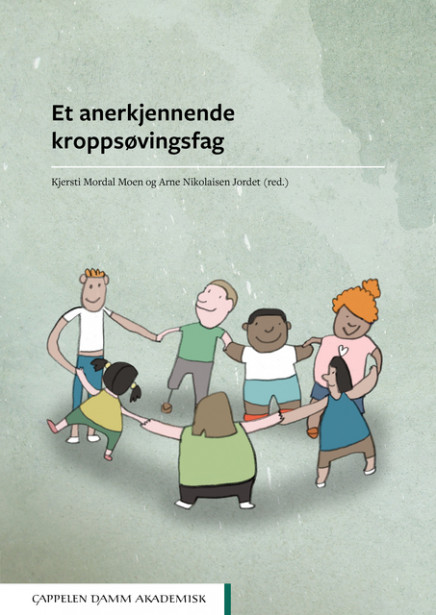Kroppsøving
Kroppsøving - fagdidaktikk - Bøker i biblioteket
Søk i ORIA
Let på hylla:
372.86 Kroppsøving grunnskolen, se også 796.071
371.3 Metoder for undervisning og læring
371.384 uteskole, friluft, metoder i undervisningen
152.3 Motorikk/bevegelse (fysiologisk psykologi). Se og 155.4123 og 612.76
155.4123 Barn - motorisk utvikling. Se også 152.3 og 612.76 og 370.155 (Motorikk /bevegelse - pedagogikk)
155.418 - Barn - lek/Barnepsykologi
796.071 Idrettspedagogikk Se også fagdidaktikk grunnskolen 372.86
796.077 Coaching
796-799 Enkelte aktiviteter
796.1 Diverse spill og leker
796.2 Aktiviteter, spill og leker som krever utstyr
796.3 Ballspill og kulespill
796.4 Vektløfting, friidrett, gymnastikk
796.5 Friluftsliv - se også utendørskole - 371.384
796.6 Sykling og lignende aktiviteter
796.7 Kjøring med motorkjøretøyer
796.8 Kampidretter
796.9 Is- og snøsport
Databaser og nettsteder for søk artikler
-
ERIC (EBSCOhost) This link opens in a new window Pedagogikk/Undervising. Within the ERIC Collection, you will find records for: journal articles, books. research syntheses, conference papers, technical reports. policy papers, other education-related materials. Standard søkeoppsett: avansert søk, search mode: Boolean/Phrase (standard operator mellom søkeordene er nærhetsoperator N#, med 5 tillatte ord , dvs. N5 settes automatisk mellom to søkeord))
-
SPORTDiscus (EBSCOhost) This link opens in a new window Referanser til tidsskriftartikler innen idrettsfagene. Dekker ulike aspekter ved sport, sportsmedisin, trening, fysiologi og relaterte aspekter.
-
Oria This link opens in a new window "Hele biblioteket i et søk" - søk etter bøker, rapporter, artikler, studentoppgaver, noter, musikk, lydbøker fra en mengde kilder (bibliotekkatalogen, tidsskriftarkiv og databaser som Web of Science, Scopus, Medline, Idunn, Norske tidsskriftartikler, Svemed+, i tillegg til åpne arkiver) . Logg på for å bestille lån og kopier og for å fornye egne lån. Samme brukernavn og passord som for fronter/canvas
-
Google Scholar This link opens in a new window Søkemotor.Søkemotor for vitenskapelig informasjon. Gir bl.a. treff på artikler utgitt av akademiske forlag, avhandlinger fra høyere utdanning, bøker, sammendrag og tekniske rapporter fra et vidstrakt forskningsområde.
-
Web of science This link opens in a new window Indekserer et utvalg av de viktigste vitenskapelige tidsskrifter i alle fag. Kjernedatabasene er Science Citation Index Expanded (1945-present), Social Sciences Citation Index (1956-present), Arts & Humanities Citation Index (1975-present). Medline er også søkbar via Web of Science. Best på realfag og medisin men dekker også samfunnsfag og humaniora. Unike muligheter for søk basert sitering
-
Scopus This link opens in a new window Referansedatabase - tidsskriftartikler. Tverrfaglig dekning, dekker blant annet Embase&Medline og Engineering Village. Dekker også mange av tidsskriftene som indekseres i Cinahl, SportDiscus, Psycinfo, Web of science. (Kilde Ulrichsweb). Via Scopus finner du også analyseverktøy for bibliometriske analyser. Også med mulighet for AI søk, still forskningsspørsmålet ditt i naturlig språk, Scopus genererer en søkestreng, og fra artikler som blir funnet, oppsummerer disse, og genererer forslag til nye spørsmål. God å bruke i en orienterende søkefase
Generelt:
søk med ord som du mener beskriver det du er på jakt etter. Søk også med synonyme/relaterte ord. Søk ev både engelsk og norsk. Se søkehjelp ORIA og databaser EBSCOhost. Nedenfor noen eksempler, generelle på kroppsøving
Norske artikler
- Artikler fra idunn.no (tidsskrifter utgitt av Universitetsforlaget) - kroppsøving* OR gym OR gymfag* OR gymnastikk* link til treff
- Norske tidsskriftartikler - link til søk, kroppsøving* OR gym*
- Søk i ORIA, avansert søk, velg materialtype artikler, begrens ev i trefflisten til fagfellevurderte tidsskrift
- Artikler i tidsskriftet Kroppsøving (avsluttet 2015)
- Artikler i tidsskriftet Journal for research in arts and sports education. https://jased.net/index.php/jased
Internasjonale artikler
Eksempler på søk i databaser, se nedenfor, Kroppsøving/Norge
- Kroppsøving, norge: TI ("physical education" OR "PE" OR "PEH") AND TX (norway OR norwegian) limit Peer Review, year:2009- (fra søk i basene SPORTDiscus & ERIC via EBSCOhost) link til treff (Se eksempel på søk i basene nedenfor film)
- Tilsvarende søk som ovenfor link i Web of Science, Core Collection: link til søk
- Artikler i tidsskriftet Journal for Research in Arts and Sports Education. https://jased.net/index.php/jased
Eksempel på søk i baser via EBSCOhost
(via EBSCOhost finner du basene ERIC og SPORTDiscus)
>> se mer om søk i baser via EBSCOhost databaser (MEDLINE, SPORTDiscus, ERIC..)
>> flere søkeveiledninger
Du kan også finne artikler via å bla i enkelte tidsskrifter
European Physical Education Review
Eksempler artikler
Diloy-Peña, S., Abós, Á., Sevil-Serrano, J., García-Cazorla, J. & García-González, L. (2024). Students’ perceptions of physical education teachers’ (de)motivating styles via the circumplex approach: Differences by gender, grade level, experiences, intention to be active, and learning. European Physical Education Review, 1356336X241229353. https://doi.org/10.1177/1356336X241229353
Treschman, P., Stylianou, M. & Brooks, C. (2024). A scoping review of feedback in physical education: Conceptualisations and the role of teachers and students. European Physical Education Review, 1356336X241230829. https://doi.org/10.1177/1356336X241230829
Eksempel på søkeord, engelsk:
Bevegelsesglede: Joy* OR OR delight* OR enjoy* OR happy OR happiness OR meaningful* OR pleasure* OR flow OR fun OR funny OR affection*
Videre mulige
... satisfact* OR wellbeing OR well-being OR attitude* OR perception*
Kroppsøving; "physical education"
Lærer: teach*
skole: school*
Noen titler, norsk og engelsk
Ingulfsvann, L. S. (2021). Bevegelsesglede i kroppsøving- hva, hvorfor og hvordan. I K. Skjesol & I. Lyngstad (Red.), Kroppsøving, læreren og eleven : pedagogiske emner og forskningsinnsikter (s. 39-55). Fagbokforlaget. Søk boka i ORIA
Eksempel på treff, søk på ord i tittel: TI ( Joy* OR OR delight* OR enjoy* OR happy OR happiness OR meaningful* OR pleasure* OR flow OR fun OR funny OR affection*) AND TI "physical education" limit Peer review/English, ERIC & SPORTDiscus via EBSCOhost. Link til treff
-
-
Kroppsøving i LK20 : planlegging, undervisning og vurdering by
Call Number: 372.86 EvePublication Date: 2023
Søk norske artikler:
søk i Norske tidsskriftartikler NORART, ikke oppdater etter 2020:
Søk i ORIA (mitt bibliotek, dekker bøker og artikler) søk norske artikler og bøker: Limit ev til søk på artikler
Gå til spesifikke tidsskrift, bla i innhold: eksempel det nordiske, Journal for Research in Arts and Sports Education
Aasland, E., & Engelsrud, G. (2017). «Det er lett å se hvem av dere som har god innsats». Om elevers innsats og lærerens blikk i kroppsøving. Journal for Research in Arts and Sports Education, 1(3). https://doi.org/10.23865/jased.v1.889
Søk forskningsartikler, publisert på engelsk, via flere databaser:
Søk i SPORTDiscus og ERIC via EBSCOhost:
Noen søkeord, OR mellom ord for samme konspet, ordene kan trunkeres med en * for treff på ulike endelser. Ordene kan også avgrenses i søket til søk på ord fra spesifikke felt, som ord fra tittelen. Sett forkortelser i anførselstegn, det samme gjelder ord som skal søkes ved siden av hverandre
- Elevvurdering, karakter: evaluat* OR grading OR assess*
- Kroppsøving: "physical education"
- Lærer: teacher* OR instructor* OR pedagog* OR Educator*
- student, elev: student* OR pupil*
- Skandinavisk kontekst, søkt med feltkode TX (alle felt som er søkbare): TX (norway OR norwegian OR sweden OR swedish OR denmark OR danish OR scandinav* OR nordic*)
Eksempel på søk, avgrenset søk med ord fra tittelen til artikkelen, se feltkoden TI foran søkeordene:
TI ("physical education*" OR "PE" OR "PEH") AND TI (grading OR assess* OR evaluat*)
Limit 2010-current, Peer Review
Søk i WoS basene, Core Collection:
avgrenset søk på ord fra tittelen
suppler eventuelt med søk i Google Scholar,
Treff fra forskningsartikler og studentoppgaver
| = OR
Automatisk AND mellom søkeord
intitle: ord fra tittel
intitle:"physical education"|PE|PEH intitle:grading|assessing|assessment|evaluat|evaluation
Nytt søk, her lagt til kontekst: Skandinavia
intitle:"physical education"|PE|PEH intitle:grading|assessing|assessment|evaluat|evaluation sweden|norway|norwegian|swedish|denmark|danish|scandinavian|nordic
Søk med norske ord,
kroppsøving karakter|elevvurdering|vurdering|karakterer|karakteren|karakterene
Se guider for søk og linker til databasene
Eksempler artikler:
Fra søk kontekst Skandinavia
- SPORTDiscus, ERIC via EBSCOhost: TI ("physical education*" OR "PE" OR "PEH") AND TI (grading OR assess* OR evaluat*) AND TX (norway OR norwegian OR sweden OR swedish OR denmark OR danish OR scandinav* OR nordic*)
- Tilsvarende søk WoS basene
- Tilsvarende søk Scopus: TITLE(evaluat* OR grading OR assess*) AND TITLE("physical education*" OR "PE" OR "PEH") AND ALL(norway OR norwegian OR sweden OR swedish OR denmark OR danish OR scandinav* OR nordic*) link
Utvalg artikler fra søk ovenfor
Linda Røset, Ken Green, Thorsteinn Sigurjonsson, Hege Eikeland Tjomsland, Lorraine Cale, & Miranda Thurston. (2024). “Now We Have Gym, Now We ‘Have’ to Perform”: Norwegian Students’ Perceptions of Assessment and Grading in Physical Education. European Educational Research Journal, 23(6), 879–901. https://doi.org/10.1177/14749041231175565
Modell, N., & Gerdin, G. (2022). “But in PEH It Still Feels Extra Unfair”: Students’ Experiences of Equitable Assessment and Grading Practices in Physical Education and Health (PEH). Sport, Education and Society, 27(9), 1047–1060. https://doi.org/10.1080/13573322.2021.1965565
Aarskog, Eirik. 2021. “‘No Assessment, No Learning’: Exploring Student Participation in Assessment in Norwegian Physical Education (PE).” Sport, Education and Society 26 (8): 875–88. doi:10.1080/13573322.2020.1791064.
Lyngstad, I., Bjerke, Ø., Bang, K. M., & Lagestad, P. (2022). Norwegian Upper Secondary Students’ Experiences of Their Teachers’ Assessment of and for Learning in Physical Education: Examining How Assessment Is Interpreted by Students of Different Physical Abilities. Sport, Education and Society, 27(3), 320–331. https://doi.org/10.1080/13573322.2020.1842728
Svennberg, L., Meckbach, J., & Redelius, K. (2018). Swedish PE Teachers Struggle with Assessment in a Criterion-Referenced Grading System. Sport, Education and Society, 23(4), 381–393. https://doi.org/10.1080/13573322.2016.1200025
Backman, E., Nyberg, G., & Larsson, H. (2020). Moving beyond Rigid Orthodoxies in the Teaching and Assessment of Movement in Swedish Physical Education Teacher Education: A Student Perspective. European Physical Education Review, 26(1), 111–127. https://doi.org/10.1177/1356336X19837287
Backman, E., & Pearson, P. (2016). “We Should Assess the Students in More Authentic Situations”: Swedish PE Teacher Educators’ Views of the Meaning of Movement Skills for Future PE Teachers. European Physical Education Review, 22(1), 47–64. https://doi.org/10.1177/1356336X15589203
Leirhaug, P. E., MacPhail, A., & Annerstedt, C. (2016). “The Grade Alone Provides No Learning”: Investigating Assessment Literacy among Norwegian Physical Education Teachers. Asia-Pacific Journal of Health, Sport and Physical Education, 7(1), 21–36. https://doi.org/10.1080/18377122.2016.1145429
Leirhaug, P. E., & MacPhail, A. (2015). “It’s the Other Assessment That Is the Key”: Three Norwegian Physical Education Teachers’ Engagement (or Not) with Assessment for Learning. Sport, Education and Society, 20(5), 624–640. https://doi.org/10.1080/13573322.2014.975113
Svennberg, L. (2017). Swedish PE Teachers’ Understandings of Legitimate Movement in a Criterion-Referenced Grading System. Physical Education and Sport Pedagogy, 22(3), 257–269. https://doi.org/10.1080/17408989.2016.1176132
Leirhaug, P. E., & Annerstedt, C. (2016). Assessing with New Eyes? Assessment for Learning in Norwegian Physical Education. Physical Education and Sport Pedagogy, 21(6), 616–631. https://doi.org/10.1080/17408989.2015.1095871
Tolgfors, B. (2018). Different Versions of Assessment “for” Learning in the Subject of Physical Education. Physical Education and Sport Pedagogy, 23(3), 311–327. https://doi.org/10.1080/17408989.2018.1429589
Leirhaug, P. E. (2016). Exploring the Relationship between Student Grades and Assessment for Learning in Norwegian Physical Education. European Physical Education Review, 22(3), 298–314. https://doi.org/10.1177/1356336X15606473
Annerstedt, C., & Larsson, S. (2010). “I Have My Own Picture of What the Demands Are...”: Grading in Swedish PEH--Problems of Validity, Comparability and Fairness. European Physical Education Review, 16(2), 97–115. https://doi.org/10.1177/1356336X10381299
Svennberg, L., Meckbach, J., & Redelius, K. (2014). Exploring PE Teachers’ “Gut Feelings”: An Attempt to Verbalise and Discuss Teachers’ Internalised Grading Criteria. European Physical Education Review, 20(2), 199–214. https://doi.org/10.1177/1356336X13517437
Tolgfors, B. (2019). Transformative Assessment in Physical Education. European Physical Education Review, 25(4), 1211–1225. https://doi.org/10.1177/1356336X18814863
Tolgfors, B., & Öhman, M. (2016). The Implications of Assessment for Learning in Physical Education and Health. European Physical Education Review, 22(2), 150–166. https://doi.org/10.1177/1356336X15595006
Redelius, K., & Hay, P. (2012). Student views on criterion-referenced assessment and grading in Swedish physical education. Physical Education & Sport Pedagogy, 17(2), 211–225. https://doi.org/10.1080/17408989.2010.548064
WoS:
Annerstedt, C. & Larsson, S. (2010). 'I have my own picture of what the demands are ... ': Grading in Swedish PEH - problems of validity, comparability and fairness. European Physical Education Review, 16(2), 97-115. https://doi.org/10.1177/1356336x10381299
Backman, E., Nyberg, G. & Larsson, H. (2020). Moving beyond rigid orthodoxies in the teaching and assessment of movement in Swedish physical education teacher education: A student perspective. European Physical Education Review, 26(1), 111-127. https://doi.org/10.1177/1356336x19837287
Backman, E. & Pearson, P. (2016). "We should assess the students in more authentic situations': Swedish PE teacher educators' views of the meaning of movement skills for future PE teachers. European Physical Education Review, 22(1), 47-64. https://doi.org/10.1177/1356336x15589203
Backman, E., Quennerstedt, M., Tolgfors, B. & Nyberg, G. (2024). Peer assessment in physical education teacher education - a complex process making social and physical capital visible. Curriculum Studies in Health and Physical Education, 15(3), 274-288. https://doi.org/10.1080/25742981.2023.2256327
Barkoukis, V., Taylor, I., Chanal, J. & Ntoumanis, N. (2014). The relation between student motivation and student grades in physical education: A 3-year investigation. Scandinavian Journal of Medicine and Science in Sports, 24(5), E406-E414. https://doi.org/10.1111/sms.12174
Bezeau, D., Chevrier, J. R. & Savard, M. (2023). Opinions on grading and difficulties encountered by physical education and health teachers in relation to assessment. Physical Education and Sport Pedagogy. https://doi.org/10.1080/17408989.2023.2269959
Bezeau, D., Turcotte, S., Desbiens, J. F., Spallanzani, C., Roy, M., Vandercleyen, F. & Beaudoin, S. (2023). Physical education teachers' assessment practices in health education. Physical Education and Sport Pedagogy. https://doi.org/10.1080/17408989.2023.2230280
Davies, K. F., Foweather, L., Watson, P. M., Bardid, F., Roberts, S. J., Davids, K., . . . Rudd, J. R. (2023). Assessing the motivational climates in early physical education curricula underpinned by motor learning theory: SAMPLE-PE. Physical Education and Sport Pedagogy, 28(6), 630-657. https://doi.org/10.1080/17408989.2021.2014436
Eriksson, C., Quennerstedt, M. & Öhman, M. (2007). Physical education in Sweden -: a national evaluation. European Journal of Public Health, 17, 204-204. <Go to ISI>://WOS:000251544100538
Jansson, A., Mattsson, T. & Gerdin, G. (2024). Does it run in the family? How family background influences grades in physical education and health in Sweden. Curriculum Studies in Health and Physical Education. https://doi.org/10.1080/25742981.2024.2405610
Leirhaug, P. E. (2016). Exploring the relationship between student grades and assessment for learning in Norwegian physical education. European Physical Education Review, 22(3), 298-314. https://doi.org/10.1177/1356336x15606473
Leirhaug, P. E. & MacPhail, A. (2015). 'It's the other assessment that is the key': three Norwegian physical education teachers' engagement (or not) with assessment for learning. Sport Education and Society, 20(5), 624-640. https://doi.org/10.1080/13573322.2014.975113
Lyngstad, I., Bjerke, O., Bang, K. M. & Lagestad, P. (2022). Norwegian upper secondary students' experiences of their teachers' assessment of and for learning in physical education: examining how assessment is interpreted by students of different physical abilities. Sport Education and Society, 27(3), 320-331. https://doi.org/10.1080/13573322.2020.1842728
Modell, N. & Gerdin, G. (2022). 'But in PEH it still feels extra unfair': students' experiences of equitable assessment and grading practices in physical education and health (PEH). Sport Education and Society, 27(9), 1047-1060. https://doi.org/10.1080/13573322.2021.1965565
Modell, N. & Gerdin, G. (2022). 'Why don't you really learn anything in PEH?' - Students' experiences of valid knowledge and the basis for assessment in physical education and health (PEH). European Physical Education Review, 28(3), 797-815, Artikkel 1356336x221084514. https://doi.org/10.1177/1356336x221084514
Redelius, K. & Hay, P. (2009). Defining, acquiring and transacting cultural capital through assessment in physical education. European Physical Education Review, 15(3), 275-294. https://doi.org/10.1177/1356336x09364719
Redelius, K. & Hay, P. J. (2012). Student views on criterion-referenced assessment and grading in Swedish physical education. Physical Education and Sport Pedagogy, 17(2), 211-225. https://doi.org/10.1080/17408989.2010.548064
Roset, L., Green, K., Sigurjonsson, T., Tjomsland, H. E., Cale, L. & Thurston, M. (2024). 'Now we have gym, now we <i>have</i> to perform': Norwegian students' perceptions of assessment and grading in physical education. European Educational Research Journal, 23(6), 879-901. https://doi.org/10.1177/14749041231175565
Svennberg, L. (2017). Swedish PE teachers' understandings of legitimate movement in a criterion-referenced grading system. Physical Education and Sport Pedagogy, 22(3), 257-269. https://doi.org/10.1080/17408989.2016.1176132
Svennberg, L., Meckbach, J. & Redelius, K. (2014). Exploring PE teachers' 'gut feelings': An attempt to verbalise and discuss teachers' internalised grading criteria. European Physical Education Review, 20(2), 199-214. https://doi.org/10.1177/1356336x13517437
Svennberg, L., Meckbach, J. & Redelius, K. (2018). Swedish PE teachers struggle with assessment in a criterion-referenced grading system. Sport Education and Society, 23(4), 381-393. https://doi.org/10.1080/13573322.2016.1200025
Tolgfors, B. (2018). Different versions of assessment <i>for</i> learning in the subject of physical education. Physical Education and Sport Pedagogy, 23(3), 311-327. https://doi.org/10.1080/17408989.2018.1429589
Tolgfors, B. (2019). Transformative assessment in physical education. European Physical Education Review, 25(4), 1211-1225. https://doi.org/10.1177/1356336x18814863
Tolgfors, B., Quennerstedt, M., Backman, E. & Nyberg, G. (2022). Enacting assessment for learning in the induction phase of physical education teaching. European Physical Education Review, 28(2), 534-551. https://doi.org/10.1177/1356336x211056208
Tolgfors, B. & Öhman, M. (2016). The implications of assessment for learning in physical education and health. European Physical Education Review, 22(2), 150-166. https://doi.org/10.1177/1356336x15595006
Tremoen, T., Sorensen, A. & Lagestad, P. (2024). The past and current role of pupil's effort and physical tests in Norwegian physical education teacher's assessment. Frontiers in Education, 9, Artikkel 1437937. https://doi.org/10.3389/feduc.2024.1437937
Tremoen, T. S. & Lagestad, P. (2024). Norwegian physical education teachers' assessment after the introduction of a new curriculum-LK20. Sport Education and Society. https://doi.org/10.1080/13573322.2024.2320182
Aarskog, E. (2021). 'No assessment, no learning' exploring student participation in assessment in Norwegian physical education (PE). Sport Education and Society, 26(8), 875-888. https://doi.org/10.1080/13573322.2020.1791064
Kroppsøving - fagdidaktikk - Aktuelle bøker i biblioteket
-
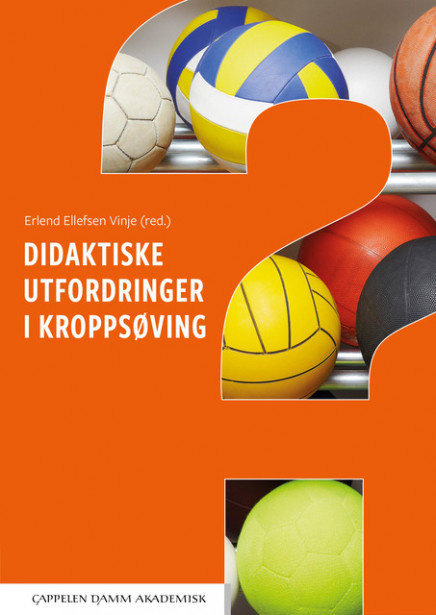 Didaktiske utfordringer i kroppsøving
Call Number: 372.86 KroISBN: 9788202675288Publication Date: 2021
Didaktiske utfordringer i kroppsøving
Call Number: 372.86 KroISBN: 9788202675288Publication Date: 2021 -
-
-
-
-
 Kroppsøving i femårig lærerutdanning
by
Publication Date: 2020
Kroppsøving i femårig lærerutdanning
by
Publication Date: 2020 -
-
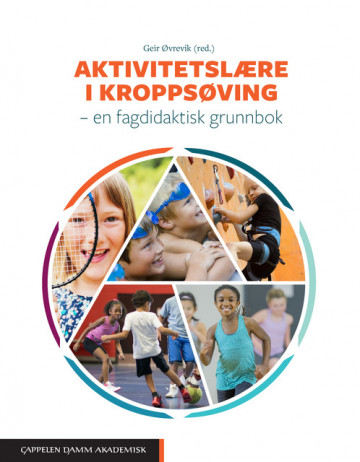 Aktivitetslære i kroppsøving – en fagdidaktisk grunnbok
by
Call Number: 796.07 AktPublication Date: 2019
Aktivitetslære i kroppsøving – en fagdidaktisk grunnbok
by
Call Number: 796.07 AktPublication Date: 2019 -
 Motivasjonsteori som utgangspunkt for å skape et best mulig læringsmiljø i kroppsøving
by
Call Number: elektronisk tilgjenglig artikkel på drottsforum.orgPublication Date: 2012Publicerad på Internet, www.idrottsforum.org/jakobsen121010,
Motivasjonsteori som utgangspunkt for å skape et best mulig læringsmiljø i kroppsøving
by
Call Number: elektronisk tilgjenglig artikkel på drottsforum.orgPublication Date: 2012Publicerad på Internet, www.idrottsforum.org/jakobsen121010,
(ISSN 1652–7224), 2012–10-10 -
 Bevegelsens årsak : elementær innføring i mekanikk og bevegelsesanalyse
Call Number: 612.76 Hol
Bevegelsens årsak : elementær innføring i mekanikk og bevegelsesanalyse
Call Number: 612.76 Hol -
-
-
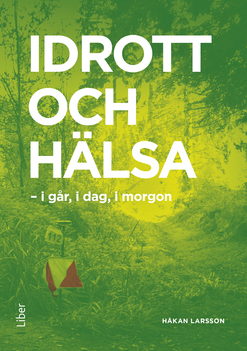 Idrott och hälsa : i går, i dag, i morgon
Call Number: 372.86 Lar
Idrott och hälsa : i går, i dag, i morgon
Call Number: 372.86 Lar -
 Innføring i kroppsøvingsdidaktikk
Call Number: 372.86 Bra
Innføring i kroppsøvingsdidaktikk
Call Number: 372.86 Bra -
-
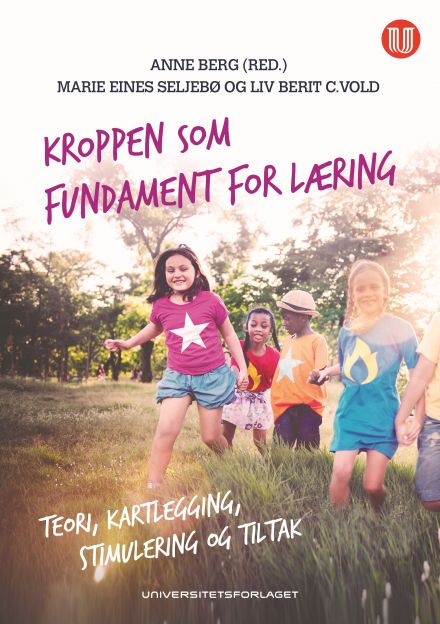 Kroppen som fundament for læring Teori, kartlegging, stimulering og tiltak
by
Call Number: 371.9 KroPublication Date: 2019
Kroppen som fundament for læring Teori, kartlegging, stimulering og tiltak
by
Call Number: 371.9 KroPublication Date: 2019 -
-
-
Phenomenology and Pedagogy in Physical Education by Phenomenology is a philosophical approach to the study of consciousness and subjective experience. In recent years it has become a more prominent element of the social scientific study of sport and a core component of the important emergent concept of physical literacy. This book is the first to offer a philosophically-sound investigation of phenomenological perspectives on pedagogy in physical education. The book argues that phenomenology offers a particularly interesting theoretical approach to physical education because of the closely embodied relationship between the knowledge object (the actions, activities and practices of movement) and the knowing subject (the pupil). Drawing on the work of key phenomenological thinkers but also exploring the implications of this work for teaching practice, the book helps to illuminate our understanding of important concepts in physical education such as practical knowledge, skill acquisition, experience and ethics. This is fascinating reading for any serious student or researcher working in physical education or the philosophy or sociology of sport.
Call Number: 372.86 StaISBN: 9781138024083Publication Date: 2016-02-04 -
Instructional Models for Physical Education by Ensures that physical educators are fully armed with a comprehensive plan for incorporating instructional models in their teaching! Instructional Models for Physical Education has two primary goals for its readers. The first is to familiarize them with the notion of model-based instruction for physical education, including the components and dimensions that determine a model's pattern of teaching and how to select the most effective model for student learning in a particular unit. The second goal is to describe each of the instructional models in such a way to give readers enough information to use any of the models with confidence and good results. The book includes everything readers will need for planning, implementing, and assessing when teaching with instructional models. It will help readers incorporate research-based practices in their lessons, adapt activities to include students of varying abilities, and teach to standards. Models tied to NASPE standards! The author has revised the third edition to show how using the instructional models can help teachers meet specific NASPE standards. The book demonstrates the connection of NASPE standards with the models and clarifies that connection for students. In addition, a table in each of the model chapters shows explicitly how the model aligns with NASPE standards.
Call Number: 796.071 MetISBN: 9781934432136Publication Date: 2011-04-01 -
 Idrott och hälsa : i går, i dag, i morgon
Call Number: 372.86 Lar
Idrott och hälsa : i går, i dag, i morgon
Call Number: 372.86 Lar -
 Exploring ‘what’ to learn in physical education
Call Number: artikkel elektronisk tilgjengelig
Exploring ‘what’ to learn in physical education
Call Number: artikkel elektronisk tilgjengelig -
 Den læreplanen som ikkje kan tilpassast mi undervisning, finst ikkje" : vurdering og undervisning i kroppsøving etter Kunnskapsløftet
by
Call Number: artikkel elektronisk tilgjengelig
Den læreplanen som ikkje kan tilpassast mi undervisning, finst ikkje" : vurdering og undervisning i kroppsøving etter Kunnskapsløftet
by
Call Number: artikkel elektronisk tilgjengelig -
 Når ambisjon møter tradisjon: En nasjonal kartleggingsstudie av kroppsøvingsfaget i grunnskolen (5.–10. trinn)
Call Number: Rapport. Elektronisk tilgjengelig
Når ambisjon møter tradisjon: En nasjonal kartleggingsstudie av kroppsøvingsfaget i grunnskolen (5.–10. trinn)
Call Number: Rapport. Elektronisk tilgjengelig -
 Curriculum, pedagogy and assessment: three message systems of schooling and dimensions of quality physical education
Call Number: artikkel elektronisk tilgjengelig
Curriculum, pedagogy and assessment: three message systems of schooling and dimensions of quality physical education
Call Number: artikkel elektronisk tilgjengelig

